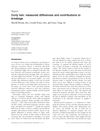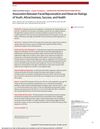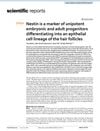 24 citations,
January 2015 in “International Journal of Trichology”
24 citations,
January 2015 in “International Journal of Trichology” Early balding in young Indian men may indicate a higher risk of metabolic syndrome and potential heart disease.
[object Object]  2 citations,
May 2023 in “Marine Drugs”
2 citations,
May 2023 in “Marine Drugs” Marine-derived saccharides may help reduce aging effects on skin and hair by promoting cell growth and collagen production.
1 citations,
March 2024 in “International journal of molecular sciences” Radiation therapy damages skin structure and immune function, causing inflammation and potential hair loss.
 April 2024 in “Communications biology”
April 2024 in “Communications biology” Enzymes involved in Vitamin A metabolism affect hair growth and type in mice.
 March 2024 in “Clinical, cosmetic and investigational dermatology”
March 2024 in “Clinical, cosmetic and investigational dermatology” Skin Radiance Collagen improved skin and hair health in adult females.
 February 2024 in “Journal of Robotic Surgery”
February 2024 in “Journal of Robotic Surgery” The document concludes that surgical robots improve surgery and recovery but are costly and can stress surgeons due to less patient contact.

Hair loss significantly lowers life quality, especially in young men, with most patients unhappy with treatment effectiveness.
 October 2023 in “Cell & bioscience”
October 2023 in “Cell & bioscience” A special gene region controls the re-emergence of a primitive wool type in Merino sheep, improving their wool yield and adaptability.
 24 citations,
May 2019 in “PLOS genetics”
24 citations,
May 2019 in “PLOS genetics” Mutations in the HEPHL1 gene cause abnormal hair and cognitive issues.
 53 citations,
March 2014 in “Cold Spring Harbor Perspectives in Medicine”
53 citations,
March 2014 in “Cold Spring Harbor Perspectives in Medicine” The document explains different types of hair loss, their causes, and treatments, and suggests future research areas.
 1 citations,
September 2023 in “Clinical, cosmetic and investigational dermatology”
1 citations,
September 2023 in “Clinical, cosmetic and investigational dermatology” Certain genetic variants linked to immune response increase the risk of alopecia areata in Taiwanese people.
 October 2023 in “Benha Journal of Applied Sciences”
October 2023 in “Benha Journal of Applied Sciences” Insulin resistance may contribute to hair loss in people with androgenic alopecia.
 229 citations,
August 2002 in “Experimental Gerontology”
229 citations,
August 2002 in “Experimental Gerontology” AGA causes hair loss by shrinking hair follicles due to DHT binding, and can be treated with finasteride and minoxidil.
 13 citations,
November 2012 in “International Journal of Dermatology”
13 citations,
November 2012 in “International Journal of Dermatology” Curly hair breaks more easily, especially with chemical treatments, but simpler grooming reduces breakage.
[object Object]  7 citations,
October 2019 in “Clinical, Cosmetic and Investigational Dermatology”
7 citations,
October 2019 in “Clinical, Cosmetic and Investigational Dermatology” Certain gene variations in the Vitamin D receptor may increase the risk of chronic hair loss.
 4 citations,
May 2021 in “Dermatologic Clinics”
4 citations,
May 2021 in “Dermatologic Clinics” The conclusion is that hair loss in women is caused by a mix of hormonal, environmental, and genetic factors, and treatments should target these various causes.
 1 citations,
June 2022 in “Zagazig Veterinary Journal/Zagazig Veterinary Journal (Online)”
1 citations,
June 2022 in “Zagazig Veterinary Journal/Zagazig Veterinary Journal (Online)” Alopecia in dogs is often caused by mange, flea and tick infestations, and nutritional deficiencies, especially in males and young dogs.
 May 2024 in “EAS Journal of Pharmacy and Pharmacology”
May 2024 in “EAS Journal of Pharmacy and Pharmacology” Pomegranate peel compounds may help treat hair loss.
 54 citations,
July 2002 in “Clinical and Experimental Dermatology”
54 citations,
July 2002 in “Clinical and Experimental Dermatology” DHT, a testosterone byproduct, causes male pattern baldness.
 24 citations,
April 2017 in “JAMA Facial Plastic Surgery”
24 citations,
April 2017 in “JAMA Facial Plastic Surgery” Facial rejuvenation surgery makes people look younger, more attractive, successful, and healthy.
 24 citations,
July 2011 in “PubMed”
24 citations,
July 2011 in “PubMed” Thyroid hormones affect skin texture, hair and nail growth, and can cause skin diseases related to thyroid problems.
 22 citations,
November 2012 in “Journal of cosmetic dermatology”
22 citations,
November 2012 in “Journal of cosmetic dermatology” Stem cells can rejuvenate skin, restore hair, and aid in wound healing.
 19 citations,
September 1995 in “Food and nutrition bulletin”
19 citations,
September 1995 in “Food and nutrition bulletin” Leucaena leucocephala is nutritious but needs careful processing to remove toxins.
 19 citations,
January 1987 in “Dermatology”
19 citations,
January 1987 in “Dermatology” Minoxidil slows down skin cell growth and may help treat scars and skin conditions.
 18 citations,
June 1988 in “Culture, medicine and psychiatry”
18 citations,
June 1988 in “Culture, medicine and psychiatry” The perception of excessive hair growth in women as abnormal is more influenced by cultural norms than by medical reasons.
 14 citations,
August 2009 in “Cancer epidemiology”
14 citations,
August 2009 in “Cancer epidemiology” AHCC reduces hair loss and liver injury caused by chemotherapy in rodents.
 1 citations,
October 2022 in “Scientific reports”
1 citations,
October 2022 in “Scientific reports” Nestin identifies specific progenitor cells in hair follicles that can become outer root sheath cells.
 August 2023 in “International journal of experimental research and review”
August 2023 in “International journal of experimental research and review” Ficus racemosa leaf extracts help heal diabetic wounds and lower blood sugar.
 42 citations,
April 2012 in “Seminars in Oncology”
42 citations,
April 2012 in “Seminars in Oncology” Targeted cancer therapies often cause skin problems that need careful management to improve patient quality of life and treatment success.
 27 citations,
January 1984 in “Pharmacology & Therapeutics”
27 citations,
January 1984 in “Pharmacology & Therapeutics” Antiandrogens have important biological effects, but more research is needed to understand them fully and compare their effectiveness and side effects to other treatments.




























